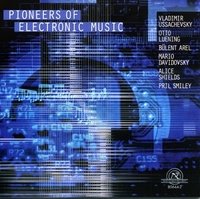Pioneers of Electronic Music- who needs Cage?
 I was pretty depressed to learn a year or two ago that one of the best collections of 20th century electronic music wasn't available any longer. I'd been meaning to write about that and how these important voices were going to be harder to find when I stumbled across a reissue that just came out. Thanks to the fine folks at New World Records, Pioneers of Electronic Music is now available again. I remember it as a wonderful asset when I was working to put together my own collection (OHM- The Early Gurus of Electronic Music, just reissued!).
I was pretty depressed to learn a year or two ago that one of the best collections of 20th century electronic music wasn't available any longer. I'd been meaning to write about that and how these important voices were going to be harder to find when I stumbled across a reissue that just came out. Thanks to the fine folks at New World Records, Pioneers of Electronic Music is now available again. I remember it as a wonderful asset when I was working to put together my own collection (OHM- The Early Gurus of Electronic Music, just reissued!).This compilation from 1991 documents some of the most important American composers who, no better word for it, pioneered the field during the 50's and 60's, and before this music crawled into pop consciousness.
Vladimir Ussachevsky and Otto Luening, who both should be on postage stamps by now, helped to found and nurture the Columbia-Princeton Electronic Music center with composer Milton Babbitt. Some of the history of the center can be found at PSF.
What's striking about Ussachevsky's and Luening's work is how utterly other worldly it still sounds today. Their experiences with tape manipulation produced oddly compelling sounds above and beyond what was up until then unheard from conventional instruments.
(As an interesting later connection, when I was writing a piece about Zappa's early music for Relix, I was wondering where the wild electronic music he created on albums like We're Only In It For the Money originated from. He was a big Varese fan of course but listen to some of Ussachevsky's compositions on the Pioneers album and see if it doesn't match what Zappa did later.)
In addition to Vlad and Otto, Pioneers also chronicles the too-often ignored work of women in the field including Alice Shields and Pril Smiley (a wonderful person, by the way).
It's so nice to think that this wonderfully strange, historically important music is available now. It's also gratifying to think that the Columbia center is still around and thriving, now called the Computer Music Center ("the oldest center for Electroacoustic music in the United States").

2 Comments:
Well... nice collection. I have listened to Ussachevsky's "Wireless Fantasy". I wonder if such electronic music is still actual for the audience. There are no comments here, but it doesnt matter, the compositions have made an effect on me. Back to Ussachevsky. His Wireless Fantasy made me search for more information, as it seemed to me as an attempt to find the way to reach the collective consciousness of the mankind. It can be called "The God". Anyway, that's an ideal of the freedom of the mind. And that's the way to defeat one's anxiety.
Actually, I have nothing more to say. And what I've said is nothing. Nothing more but a napplication of John Cage's minimalistic poetry. I leave a message for nobody and I'm looking forward to get a response from nowhere. mephaz@gmail.com
A very important statement that Schleiermacher makes is that there is no "correct" or "incorrect" version of "Music for Pian", but instead "boring" or "interesting", "appealing" or “monotonous” interpretations.
Post a Comment
<< Home